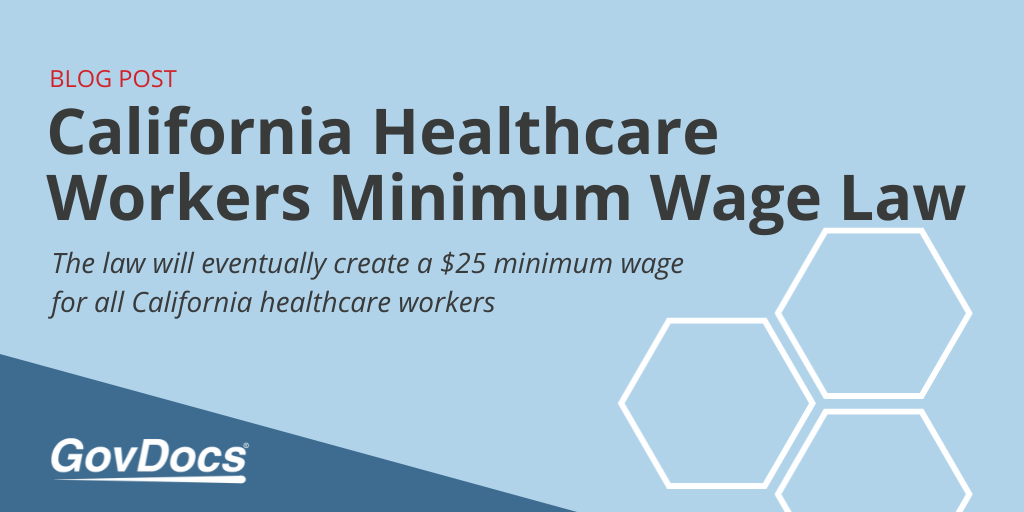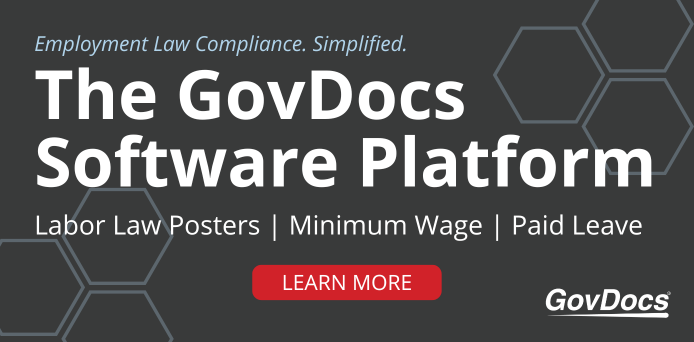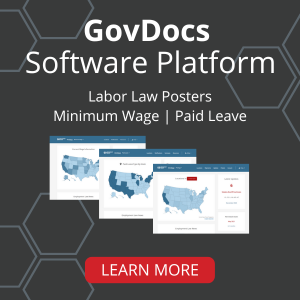EMPLOYMENT LAW NEWS
California Healthcare Workers Minimum Wage Law
By Kris Janisch
Published Oct. 31, 2023

Healthcare employers in California should review the provisions of the law to ensure compliance.
A California healthcare workers minimum wage law will take effect June 1, 2024.
Gov. Gavin Newsome signed the legislation in October 2023, creating several minimum wage rates, depending on the nature of the facility, for covered healthcare employees.
It’s the latest minimum wage activity for the state, following the passage of a California fast food workers minimum wage law this fall.
Eventually, all healthcare workers in California will earn at least $25 an hour, and the law impacts nearly every type of healthcare facility in the state.
(For county-owned facilities, the applicable rates kick in Jan. 1, 2025. The law does not apply to state-owned hospitals or tribal clinics.)
Minimum Wage Management. Simplified.
California Healthcare Workers Minimum Wage Law
Before getting to the new minimum wage rates for California healthcare workers, the statute broadly defines covered employees, including:
An employee of a health care facility employer who provides patient care, health care services, or services supporting the provision of health care, which includes, but is not limited to, employees performing work in the occupation of a nurse, physician, caregiver, medical resident, intern or fellow, patient care technician, janitor, housekeeping staff person, groundskeeper, guard, clerical worker, nonmanagerial administrative worker, food service worker, gift shop worker, technical and ancillary services worker, medical coding and medical billing personnel, scheduler, call center and warehouse worker, and laundry worker, regardless of formal job title.
There are also some instances in which a contracted or subcontracted employee would be covered.
Also, for salaried employees, the employee must earn a monthly salary equivalent to at least 150 percent of the healthcare worker minimum wage or 200 percent of the applicable minimum wage, whichever is greater, in order to qualify as exempt from the payment of minimum wage and overtime.
Below are the new rates and brief descriptions of each type of facility.
Large Providers and Integrated Health Systems
To begin, the rates for large healthcare facilities are:
- June 1, 2024 – $23
- June 1, 2025 – $24
- June 1, 2026 – $25
Such providers are generally those with 10,000 or more employees, including county-owned facilities if the population of the county is more than 5 million. Dialysis clinics are also included here.
Hospitals
Regarding hospitals, the rate will be $18 starting June 1, 2024, with 3.5 percent annual increases until it reaches $25 in 2033.
These are facilities with a “high governmental payor mix, an independent hospital with an elevated governmental payor mix, a rural independent covered health care facility,” as well as county-owned hospitals in a county with a population of less than 250,000.
Clinics
Employees at clinics, meanwhile, will see minimum wage rates of:
- June 1, 2024 – $21
- June 1, 2026 – $22
- June 1, 2027 – $25
These are primary care clinics, non-governmental free clinics, community clinics and any associated intermittent clinic, rural clinics, and urgent care clinics owned or affiliated with community or rural care clinics.
Licensed Skilled Nursing Facility
This also has a separate rate for a licensed skilled nursing facility:
- $21 per hour starting June 1, 2024
- $23 per hour starting June 1, 2026
- $25 per hour starting June 1, 2028, and until as adjusted as specified
The bill would make this minimum wage requirement effective only when a patient care minimum spending requirement applicable to skilled nursing facilities is in effect.
Other Healthcare Facilities
Other healthcare facilities will follow a slightly different schedule:
- June 1, 2024 – $21
- June 1, 2026 – $23
- June 1, 2028 – $25
These would be the types of facilities not covered by the ones above.
Minimum Wage Compliance Resources
California Healthcare Workers Minimum Wage Law: Covered Employers
Under the law, nearly every type of healthcare provider in California is covered, including a:
- Facility or other worksite that is part of an integrated health care delivery system
- Licensed general acute care hospital
- Licensed acute psychiatric hospital
- Licensed skilled nursing facility
- Patient’s home when health care services are delivered by an entity owned or operated by a general acute care hospital or acute psychiatric hospital
- Licensed home health agency
- Clinic
- Psychology clinic
- Licensed residential care facility for the elderly
- Psychiatric health facility
- Mental health rehabilitation center
- Community clinic or rural health clinic
- Urgent care clinic
Minimum Wage Compliance Management
While California’s minimum wage rates will always present challenges, the latest development with industry-specific rates raises another question — will other jurisdictions follow suit?
It’s fair for employers to wonder. California is often at the forefront of new employment laws, and other states, counties and cities may introduce similar legislation in the coming years. The California healthcare minimum wage statute specifically references the COVID-19 pandemic and other issues facing the industry.
Still, it is worth noting the growth of minimum wage laws in general. The small city of Edgewater, Colo., passed a new minimum wage law that goes into effect at the start of 2024. And Maryland accelerated the pace of its minimum rate this year.
How Many States Have a $15 Minimum Wage?
Meanwhile, this far into the minimum wage movement (and now it has become a Fight for $20 as a new minimum wage push), indexing is more common. When jurisdictions increase their rates based on the applicable Consumer Price Index instead of scheduled increases, it becomes more difficult for employers to keep up. Some jurisdictions only announce these new rates weeks before the effective date, making it even more of a headache to maintain compliance.
Conclusion
Healthcare employers in California should review the provisions of the law to ensure compliance.
With so many rates applying to all these different types of facilities, employers should examine the legislation to determine what minimum wage may apply to their locations.
Lastly, there are items within the law that may allow employers to seek relief. Consulting legal counsel is always wise.
This Employment Law News blog is intended for market awareness only, it is not to be used for legal advice or counsel.
Keep Informed
with GovDocs Employment Law News
Who is GovDocs?
GovDocs simplifies employment law compliance for large employers in the U.S. and Canada. The GovDocs software platform integrates three solutions in one convenient place to help you master the employment laws impacting your business. Whether you manage a labor law posters, minimum wage or paid leave program, our products cut through research time, provide proactive insights into the everchanging landscape of employment laws and reduce the risk of noncompliance. The company is headquartered in Eagan, Minn.
The GovDocs Poster Store simplifies posting compliance for employers with less than 30 locations across all industries, offering a variety of posting products to meet your labor law compliance needs.





